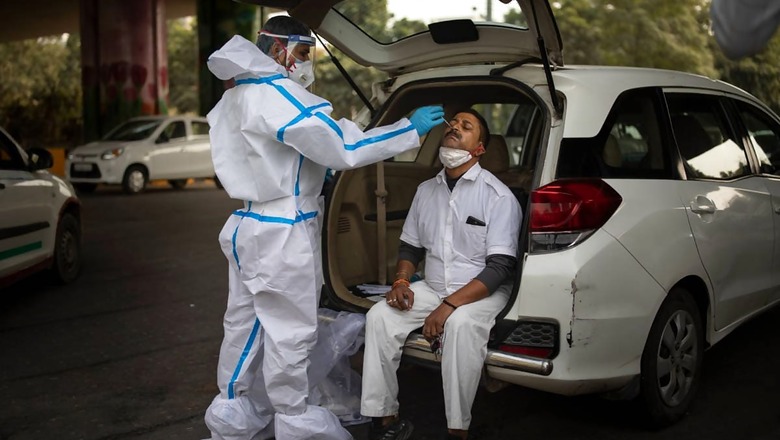
views
Viruses mutate all the time. Some are minor mutations and do not cause any concern; others can become what we call “Variants of Concern”.
On December 14, Matt Hancock, Secretary of State for Health in the United Kingdom, formally announced the existence of a new variant of Covid-19. This variant confirmed by the Public Health England and the UK’s sequencing consortium COG-UK (COVID-19 Genomics UK Consortium) was first identified in the county of Kent on September 20.
It was named Variant of Concern 202012/01 (VOC -202012/01) or lineage B117 and carried more than a dozen mutations, including seven in the spike protein (which the viruses utilizes to attach to the human cells, and thereby gain entry into cells of the body).This mutation rendered the virus about 70 per cent more transmissible than the conventional Covid-19 which had caused the first pandemic peaks across the world in early and mid-2020.
From September to November, its extensive spread in the UK led to introduction of stricter rules for the UK population (division of counties and areas into four tiers with varying rules applicable for mixing depending upon viral load and R-numbers), and restricted mixing of different households during Christmas and New Year period in the UK.
On December 18, South Africa also alerted the world about another mutation in Covid-19 which was rapidly spreading, becoming the dominant strain in three of its provinces—Eastern Cape, Western Cape and KwaZulu-Natal. The mutation, which also existed in the spike protein, was called N501Y mutation. The mutant virus was named B1351.
On January 6, the National Institute of Infectious Diseases (NIID) Japan detected yet another Covid variant in four travellers from Brazil’s Amazonas state. This variant had 12 mutations in spike protein and belongs to the B11248 strain, later named P1.
These variants popularly came to be known as the UK variant, the South African variant and the Brazil variant, respectively, based on the country where they were first discovered or isolated or believed to have come from.
The Changing Landscape
These mutations increased the transmissibility of the virus by altering the spike protein and increasing its entry into host cells. As a result, the pandemic, which was previously under reasonable control, started showing resurgence.
The variants have spread to a number of countries, forcing lockdowns in the UK, parts of Europe, and partial lockdowns elsewhere. Even the countries which had excellent control over cases like Australia and New Zealand received the mutants and enforced lockdowns. A number of countries have introduced travel bans with flights from the UK, South Africa, Brazil and the Middle East (prominently UAE) either suspended or entry restricted with quarantine measures.
ALSO READ| Barely Months into World’s Biggest Vaccine Drive Against Covid-19, Fault Lines Have Started to Appear
The UAE, particularly Dubai, which kept its party reputation alive during Christmas and New Year, saw an ugly resurgence this year, forcing bars and pubs to down shutters and minimum passenger travel.
India has, so far, reported 187 confirmed cases of the UK mutant strain, which is believed to have entered the country in the later part of 2020. Four persons were detected with the South African strain in January and one with the Brazilian variant in the first week of February.
Should India Worry?
Looking at the path Covid-19 has taken in India, experts world over are baffled as the predicted and modelled rate of infections have been off the mark, more so, in the case of predicted and modelled mortality. A number of theories have been put forward to explain this. Some believe there has been underreporting of cases and deaths and a large number of asymptomatic infections have gone unnoticed. Others have put it down to the innate immunity as a result of comparatively poorer hygienic conditions and a higher prevalence of communicable diseases. Yet others believe it is the Indian weather and lifestyle. Whatever be the true reason, the fact remains the Indian population has shown resilience. This has also been demonstrated by the recent sero-surveys, which showed prevalence rates of Covid-19 antibodies to an estimated 50-55 per cent in some parts.
The big question remains whether or not we would show similar performance with the mutant strains. Some people are pointing towards vaccines. Both Covishield and Covaxin have been launched in India without satisfactory phase-3 trials and are still being clinically tested against the mutant strains.
If we go back in time, we would find that between January and April last year, the UK and Europe had been overwhelmed with Covid-19, whereas India did not have many cases. Come May and July, and we started witnessing a surge in numbers, with August and September showing heaviest caseload. One could conclude that Covid-19 was silently at work in India between January and April before its impact was felt just when the lockdown was lifted.
If we look at the current situation, the UK and the Europe are again overwhelmed (with mutant strains) despite progress in vaccination, and India is in a relatively comfortable state. But, this raises the question—whether the mutant strains are also silently at work among the Indian population and waiting for the right time to surface, given that there are no restrictions in place and people already immune to the conventional Covid-19 can get re-infected by a mutant strain.
The recent report of 103 cases detected from a single society in Bengaluru after a party indicates a heavy spread, typical of mutant strains. Maharashtra has again shown a surge in cases this week. India is currently performing about 5 per cent genome sequencing, but we need to do better else we might not know the full extent of the mutant load.
The Ministry of Civil Aviation this week amended travel rules, especially for international passengers from the UK, South Africa and Brazil. However, more needs to be done—we don’t want to be caught off guard by the rise of the mutants.
“The more I learn, the more I realize what I don’t know”—Albert Einstein
(This article is the second in a series on Covid-19 and vaccines by the author. The previous article can be read here)
Read all the Latest News, Breaking News and Coronavirus News here


















Comments
0 comment